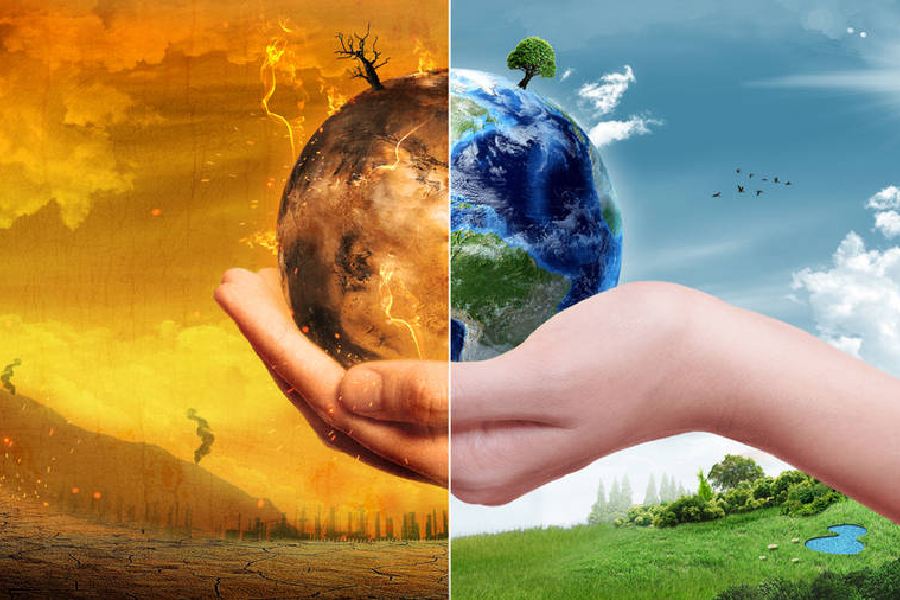India will account for over half of the 197 cities and towns worldwide that will experience temperatures above 35°C for 150 days or longer every year under a 3°C global warming, a new analysis released on Wednesday said.
The analysis by experts at the World Resources Institute (WRI), a US-based climate and environment think tank, has found that the global count of such cities will increase from 52 to 67 under 1.5°C and to 94 under 2°C global warming.
The findings portend a dramatic increase in populations exposed to extreme heat and underline the importance of limiting global temperature to 1.5°C, the WRI said, releasing the analysis ahead of an annual UN climate conference that starts in Dubai on Thursday.
Prime Minister Narendra Modi will be among 160 global leaders expected to attend the conference where delegates from over 190 countries will review progress and plan future actions aimed at preventing the average global temperature from rising above 1.5°C or 2°C above pre-industrial levels.
The planet is already 1.1°C warmer now than it was in the late 19th century. Scientists have predicted that under current patterns of Earth-warming greenhouse gas emissions, global warming could exceed 1.5°C within years and reach 2.5°C to 2.9°C by 2100.
Among the 197 cities to experience 35°C for 150 days or longer under 3°C warming, 103 cities will be in India, according to the analysis. The actual temperature rise in many of these cities will be even higher because of what scientists call the urban heat island effect — up to 8°C higher temperatures around concrete and other urban structures compared with their surrounding rural areas.
The WRI analysis has cited projections for Ahmedabad to flag how the annual exposure to extreme heat will get worse. Ahmedabad currently has on average 164 days with temperatures exceeding 35°C. Under global warming of 3°C, the number of such days in the city will rise to 225.
“This is similar to what is currently seen in near-Saharan cities Maiduguri, Nigeria,” the WRI said.
Ahmedabad, Anand, Bikaner, Jodhpur, Vadodara and Tirupati were among the cities that experienced 150 days or more of 35°C temperatures between 1995 and 2014.
Under global warming, the count will rise. For instance, under 1.5°C warming, Bhavnagar and Rajkot will join that list. Under 2°C warming, Agra, Ajmer, Banda, Bhind, Etawah, Fatehpur, Firozabad, Gwalior, Allahabad and Vellore will also begin experiencing temperatures that exceed 35°C annually for 150 days or longer.
Climate and environment experts have highlighted the need for such cities to adapt to the rising temperatures through an array of interventions —ranging from adding tree cover to early warning systems to caution populations to find ways to reduce heat exposure.
However, such interventions to adapt to the extreme heat will require finance.
Some climate policy analysts have described the Dubai conference as the most consequential talks since the Paris pact in 2015. The meeting will engage in a “global stocktake” to assess progress towards achieving the aims of the Paris pact that included capping temperature rise at 1.5°C or 2°C.
Developing countries have been asking the developed countries —historically the biggest contributors to global warming — to own responsibility and support climate action and adaptation through finance and technology.
The Dubai conference “must deliver a course-correcting road map to shape the future of climate action on a global scale”, the New Delhi-based The Energy and Resources Institute said in a statement released on Wednesday.
“The global stocktake is an opportunity for the world to realise that setting long-term goals alone will not save the planet,” said R.R. Rashmi, former climate negotiator for India and currently a distinguished fellow at TERI. “It is necessary to bring adaptation financing to the core of the (conference) agenda to address short-term and long-term interests of all countries.”











